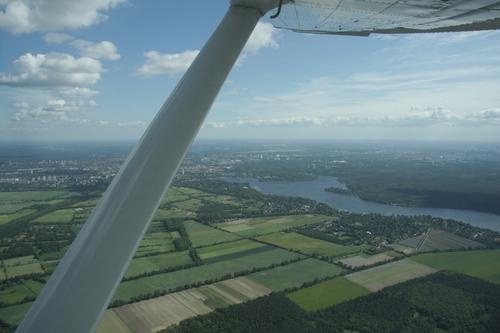Researchers Flying High
Researchers from Freie Universität study floating particles in the atmosphere and develop measurement methods
Sep 29, 2011
Airborne particles such as pollen, dust, or soot can even be detected in seemingly clear air in the region around Berlin.
Image Credit: Melanie Hansen
Meteorologist Lindemann travels in service to science, piloting the research aircraft operated by the Institute of Space Sciences at Freie Universität Berlin. The plane, a Cessna 207, is equipped with measuring devices to study the atmosphere and for remote sensing of land and water surfaces. The Cessna actually has space for eight, but five seats have been removed and replaced with equipment: The plane carries more than 300 kilograms of technical equipment on board, which takes a fair amount of space. From carbon dioxide to ozone or tiny particles called aerosols that float in the air, the instruments don’t miss a thing, right down to the tiniest particle or gas concentration. Pollen, dust, soot, and fog are present even in the cleanest-seeming atmosphere, the result of natural processes such as forest fires – or caused by people, in the form of vehicle emissions or industrial pollution.
These aerosols do not become visible, though, until the air seems to thicken, starting at a concentration of one million particles per cubic centimeter. In April 2010, when the eruption of Iceland’s Eyjafjallajökull volcano brought European air traffic to a halt, aerosols were clearly in evidence, in the form of an ash cloud that darkened the skies. The research aircraft operated by Freie Universität Berlin was one of the few to return to the air over Berlin just a short time after the eruption. Its aim: to measure the aerosol content in the atmosphere.
But what else can these measurements tell us, aside from warning air traffic about volcanic ash? “These tiny particles have a big impact on the climate,” says Professor Jürgen Fischer. “With our measurements, we hope to pinpoint these effects more precisely.” After all, depending on their visual characteristics, aerosols can have either a cooling effect on the climate or contribute to warming, depending on whether they reduce the amount of radiation from the sun that reaches the ground – like a parasol – or absorb solar energy like a sponge, convert it to heat, and then release it back into the air.
The Institute of Space Sciences is not only a site of scientific endeavor, but also of development. Equipment produced at Freie Universität Berlin is also used outside of the university itself: Germany’s largest research vessel, the icebreaker Polarstern, has used measurement instruments from Dahlem to measure aerosol distributions in maritime air masses from Bremerhaven to Costa Rica. But before the instruments can be used to take such large-scale measurements, they have to pass a number of tests of their suitability aboard the Cessna. The same is also true of instruments that will later be used on satellites.
Before its use as a flying research station, the Cessna was purely a private aircraft. Professor Reinhard Furrer, an astronaut and the founding director of the Institute of Space Sciences at Freie Universität, bought the plane in 1988, from a farmer in the United States – in order to retrofit it and use it in Berlin as a research aircraft.
Furrer, who had traveled into space three years before on the shuttle Challenger, made sure that he personally was the one to pilot the Cessna the nearly 8,000 kilometers between its original location in the United States and Berlin, with a few additional tanks and layovers in Newfoundland, Greenland, and Iceland. “Furrer often pushed the limits of what was possible,” says Professor Fischer, commenting on the challenging flight. Fischer spent years working at the Institute with the astronaut. Professor Furrer was killed in 1995, at the age of 54, when he was on board a historic plane that crashed.
The research plane’s aircraft registration code recalls the late scientist: The letters D-EAFU appear on the underside of the left wing. “The FU at the end stands for both Freie Universität and Furrer,” says Lindemann.
Further Information
Prof. Dr. Jürgen Fischer, Institute for Space Sciences, Freie Universität Berlin, Tel.: +49(0)30 / 838-56663, Email: juergen.fischer@wew.fu-berlin.de

